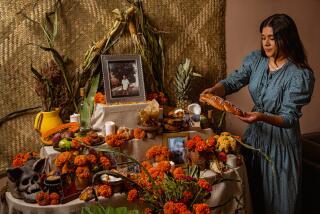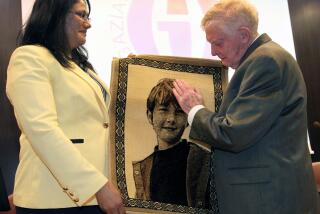Giving Organs Is Gift of Life, Churches Say
- Share via
Twice, Tina Aguilera has suffered the indescribable agony of burying a child who died young.
Twice, the devout Catholic sought solace in her faith, and in her decision to donate her sons’ organs and tissues.
For the record:
12:00 a.m. Nov. 16, 2000 For the Record
Los Angeles Times Thursday November 16, 2000 Home Edition Metro Part B Page 3 Zones Desk 1 inches; 27 words Type of Material: Correction
Organ donations--A story Friday on organ and tissue donations misidentified the church where a press conference was held. The conference was at the First United Methodist Church of Los Angeles.
“I feel like my boys were heroes,” a tearful Aguilera said Thursday, “because they saved so many lives.”
Eddie and Joe Aguilera died eight years apart, both at age 20--one from a suicide, the other a murder.
Because their bodies were fully “harvested,” Aguilera said, her two bright-eyed sons helped as many 100 others, including two heart transplant patients who would have surely died without them.
Aguilera went to a downtown church Thursday to join religious leaders in publicizing the urgent need for more organ and tissue donors, especially among pious Christians who fear that such donations violate their religious canons.
That’s anything but true, said Aguilera and representatives of the Anglican, Baptist, Catholic, Lutheran, Episcopal and Methodist churches at a prayer vigil sponsored by the Minority Organ Tissue Transplant Education Program.
“It is an act of love, an act of charity,” said Father John Keese of the Roman Catholic Church, whose sister-in-law is alive because of a kidney donation 18 years ago. “It is a way of giving of ourselves so that others may benefit.”
One by one, Keese and 11 other clergy members spoke at the First United Church of Los Angeles, and then silently held aloft tea candles “as a symbol of hope and gratitude for the gift of life.”
Then, one by one, they blew out the candles, to signify the dozen people who die every day in the United States while awaiting organs.
“There is a crisis in the country,” said the program’s board president, Miguel Medina. “There are 66,000 people on the waiting list for major organs. Another 2,000 people are added to the list each month.”
Ultimately, only half of those people will receive transplants because of a lack of donations, he said.
Each organ donor can provide potentially life-saving organs for seven people. Each tissue donor can help seven times that many.
Yet people in general are reluctant to sign donor cards.
Many of those who do sign never discuss their decisions with family members. That’s a critical mistake, because the next of kin in California must approve a donor’s pledge, often during that short window of time in which the organs can be transplanted into others.
The organ shortage is particularly serious within minority communities, especially among Latinos, outreach experts said.
Latinos make up about 11% of the general population, and donate organs in similar numbers. But a growing number of those awaiting kidneys and other organs are Latino, and they’re far more susceptible to kidney failure than the general population, said Margaret Davis of the National Kidney Foundation.
Also, transplants have a better chance of success when the donor and recipient have similar genetic backgrounds, Davis said.
The program has spent five years trying to educate Latinos about the need to do more to help those within their community. Three months ago, it got a huge boost when Pope John Paul II encouraged voluntary organ donation as not only acceptable, but “a genuine act of love.”
Still, many Latinos are reluctant, and not just for religious reasons.
Medina said many worry--unnecessarily--that if they sign donor cards, doctors may not undertake all available measures to keep them alive if they’ve been severely injured.
Another common misconception, he said, is that survivors of an organ donor would have to pay some costs attributed to the surgeries required.
As she spoke Thursday, Aguilera said she wrestled 12 years ago with the decision to authorize doctors to remove her son Eddie’s organs.
Afterward, it didn’t do anything to help ease the pain and emptiness. Then Aguilera met the husband of a co-worker in the Monrovia School District, who was barely clinging to life, awaiting a heart transplant. He received it just in time.
“I saw the other side of the coin,” said Aguilera, who has three surviving children.
So when Aguilera’s son Joe lay dying and on life support four years ago, she said yes in an instant.
“I just knew in my heart this was right,” Aguilera recalls. “I didn’t have any misgivings.”
Last May, Aguilera met the two men who now have her sons’ hearts beating within them. On Thursday, she beamed as she proudly displayed their photos, alongside some of her sons.
“We’re good friends,” Aguilera said of the two men. “Now I’ve got extra family.”
(BEGIN TEXT OF INFOBOX / INFOGRAPHIC)
Donor Information
Here are some numbers for potential organ donors to call for information or to get a donor card:
* Minority Organ Tissue Transplant Education Program: (800) 747-5527
* United Network for Organ Sharing: (888) 894-6361.
* National Kidney Foundation (800) 747-5527
* American Heart Assn.: (800) 432-7852
* American Liver Foundation: (800) 223-0179
* American Lung Assn.: (800) 586-4872
More to Read
Sign up for Essential California
The most important California stories and recommendations in your inbox every morning.
You may occasionally receive promotional content from the Los Angeles Times.













